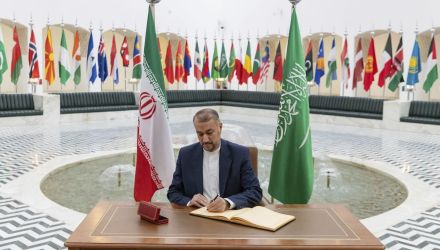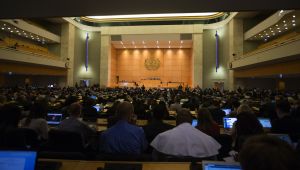Talks with Iran signify that the administration has finally abandoned a failed part of its foreign policy
Today, the highest-level contact between the U.S. and Iran in almost three decades gets underway: U.S. Undersecretary of State William Burns will join a meeting in Geneva with European Union negotiator Javier Solana, Iranian envoy Saeed Jalili and others. In classic diplomatic doublespeak, the Bush administration insists this is not "negotiation" but "pre-negotiation," with Burns as a mere "observer." But there can be no doubt that this represents a major step in overcoming fierce internal struggles within the U.S. and Iran that had left both stuck at stalemate.
In its first term, the Bush administration followed a policy of no engagement, no carrots and no serious sticks. Predictably, this led nowhere. In Bush's second term, Secretary of State Condoleezza Rice offered negotiations but only with the precondition that Iran suspend all enrichment activity. Otherwise, others in the administration argued, Iran would continue "to pursue a nuclear weapon under the cover of talk."
Iran rejected this precondition and continued with its nuclear program. In fact, the absence of talks allowed Iran to advance toward its nuclear goal. When the U.S. established its precondition 25 months ago, Iran was just beginning to test its first centrifuges. Today, more than 3,400 centrifuges are spinning in a cascade that has produced more than 500 pounds of low-enriched uranium, one-third of the material required, after further enrichment, for its first nuclear bomb.
Similarly, pragmatists appear to have outmaneuvered ideologues in Iran. Assessing Iranian decision-making is like watching a wrestling match under a Persian rug; it is difficult to discern who is doing what to whom. The clues, however, suggest that Supreme Leader Ayatollah Ali Khamenei has authorized an alternative to Iranian President Mahmoud Ahmadinejad's blustering belligerence.
Two weeks ago, Khamenei's foreign policy advisor, Ali Akbar Velayati, endorsed Solana's verbal offer of a "freeze for freeze" approach. Iran will continue to enrich uranium, but it will not install additional centrifuges, and the U.S. and its coalition partners will forgo additional sanctions.
Velayati justified this move in a newspaper interview. He said many in Israel and the U.S. wanted to see Iran "isolated." "If those who act against our interests want us not to accept [an offer]," he continued, "then it is in our interest to accept it." He pointed to a potential zone of agreement: "They say Iran should not make an atomic bomb, and we say Iran needs nuclear energy. These two principles are [their] and our red lines, which should be the basis for negotiations and can be agreed on."
In the weeks ahead, look for an intensification of conflicts within both governments. The hard-liners in the Bush administration, for example, will do their best to insist on unachievable objectives that will ensure failure of negotiation. If talks collapse, they will be able to argue that the U.S. went the extra mile and exhausted all reasonable alternatives to a military strike.
However, if Rice prevails, the administration's turnaround on North Korea provides the story line. While the U.S. was not engaged with North Korea, Pyongyang produced enough plutonium for 10 bombs and conducted a nuclear weapons test. When the administration returned to traditional diplomacy, the Yongbyon reactor was closed and, as Rice rightly claimed, Pyongyang was put "out of the plutonium-making business."
Anyone with doubts about the extent of the shift in the U.S. approach to Iran should look no further than the howls from the architect of the first-term non-engagement policy toward North Korea and Iran, John Bolton. The administration is guilty of yet another "U-turn," he argues now, which is "further evidence of the administration's complete intellectual collapse." Most reasonable people, however, will applaud this flip-flop toward reality.
Graham Allison is director of the Belfer Center for Science and International Affairs at Harvard's Kennedy School of Government and author of "Nuclear Terrorism: The Ultimate Preventable Catastrophe."
Allison, Graham. “Bush's U-turn Toward Common Sense.” Los Angeles Times, July 19, 2008




